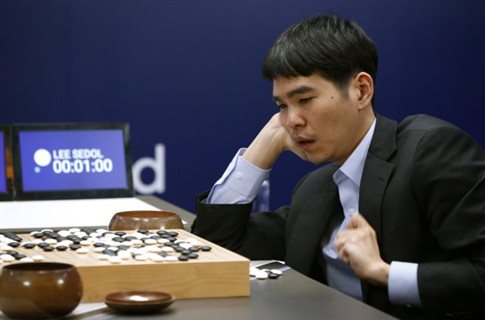chevron_left
-
play_arrow
NGradio So good... like you
Go humans: Lee Sedol scores first victory against supercomputer AlphaGo

share
close
The rise of the machines came to a halt, temporarily at least, when the champion Go player Lee Sedol beat a computer program on Sunday to prevent a whitewash after losing the first three games.
AlphaGo, developed by the Google subsidiary DeepMind, has an insurmountable lead in the series, but Sedol’s win restored some human dignity. Fans of the ancient Chinese board game cheered when AlphaGo quit after five hours and Lee was greeted by applause from journalists at the post-match news conference at a Seoul hotel.
“This one win is so valuable and I will not trade this for anything in the world,” said Lee, one of the best Go players in the world.
In Go, a game for two, players take turns putting black or white stones on a 19-by-19 grid. The winner is the player who surrounds more territory than his or her opponent. Despite its seeming simplicity, the permutations of Go vastly exceed those in chess.
The first move of a game of chess offers 28 possibilities; the first move of a game of Go can involve placing the stone in one of 361 positions. A game of chess lasts around 80 turns while Go games can last 150.
Lee played with a white stone on Sunday. For the final match of the series, scheduled for Tuesday, Lee has offered to play with black, saying it would make a victory more meaningful.
The DeepMind founder Demis Hassabis said the loss was a valuable learning tool and would help identify weaknesses in the program that needed to be fixed.
“It’s a real testament to Mr Lee’s incredible fighting spirit and he was able to play so brilliantly today after three defeats,” said Hassabis, a 39-year-old Briton who started the AI research firm and who plays master-level chess.
Before the five-game series, Lee exuded confidence. “I don’t think it will be a very close match,” he said. “I believe it will be 5–0, or maybe 4–1. So the critical point for me will be to not lose one match.”
Experts did not expect an AI program to beat a human professional for at least a decade, until AlphaGo beat a European champion player last year. Lee, however, was considered a much more formidable opponent.
Google executives say Go offers too many possible moves for a machine to win simply through brute-force calculations, unlike chess, in which IBM’s Deep Blue famously beat former world champion Garry Kasparov in 1997. Instead, they said, AlphaGo was designed to approximate human intuition by studying old matches and using simulated games to hone itself independently.
In the past, Hassabis described Go as “a bit of a holy grail for AI research”, though he stressed on Saturday that Lee’s defeat should not be seen as a loss for humanity. “Our hope is that in the long run we will be able to use these techniques for many other problems,” Hassabis said.
Written by: New Generation Radio
Rate it
Similar posts
ΔΗΜΟΦΙΛΗ ΑΡΘΡΑ
COPYRIGHT 2020. NGRADIO





















Post comments (0)